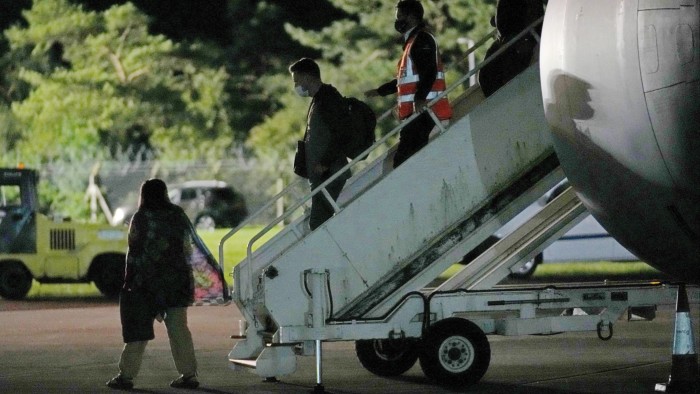Unlock the Editor’s Digest for free
Roula Khalaf, Editor of the FT, selects her favourite stories in this weekly newsletter.
The UK’s official government auditor has questioned the Ministry of Defence’s handling of a huge data leak that endangered thousands of Afghan nationals and was kept secret for two years.
The National Audit Office, an independent parliamentary body that scrutinises public spending, told the Financial Times that the MoD had not told it about the leak “in the established way for sensitive defence matters”.
Gareth Davies, comptroller and auditor general of the NAO, was now “considering the implications for the audit of the MoD’s accounts and the NAO’s value-for-money audit programme”, the body said.
“The MoD did not disclose this matter to the NAO in the established way for sensitive defence matters. The audit director for the MoD audit was briefed on a limited aspect (the fact of a data breach) and was not permitted to share that information within the NAO.”
The news comes a day after the High Court lifted a super-injunction that had banned the media from reporting that almost 24,000 Afghans affected by the breach had already been brought or will come to the UK. Officials said most would have been eligible to come to the UK in any event.

A British soldier in February 2022 accidentally leaked a database of applicants to a scheme for Afghans who had worked with the UK before the Taliban retook power in 2021. The leak was not discovered until August 2023 and soon after a super-injunction was imposed.
The MoD claimed it had reached an understanding with the NAO for a more “limited” description of the incident than usual to be included in the department’s accounts last year, according to court papers.
This was set to be a narrow “narrative” reference to the matter. But the department’s published report, released last July, omitted even the agreed formulation.
“Unfortunately, for reasons that are unclear to me, the narrative response was not provided and the [MoD annual] report itself did not replicate the agreed approach,” Dominic Wilson, a senior civil servant, told the High Court in January.
He said the proposed remedy for this “deficiency” was to provide a “footnote with additional context” in the department’s accounts this year.
An NAO official told the FT that the NAO “had no role in the decision on whether or not to disclose the incident”.
The MoD did not immediately respond to a request for comment.
The previous Conservative government created a secret immigration scheme known as the Afghan Response Route to get people whose data had been leaked out of Afghanistan and into the UK.
The leaked database had the personal details of 25,000 people on it. UK officials have indicated that many had worked for the previous Afghanistan government but not directly with the UK.
The cost of the secret relocation plan as recently as February this year, under Sir Keir Starmer’s current Labour administration, was estimated at £7bn over several years, according to a government memo.
Defence secretary John Healey said on Tuesday that the secret scheme would instead cost about £850mn over its lifetime because ministers were limiting the number of people who would be relocated.
“There is little or no evidence that there is a systematic retribution campaign going on [in Afghanistan],” he told the BBC.
The £850mn figure relates only to the cost of relocating people via the secret ARR scheme. There is also a cohort of at least 1,000 people who the government says arrived by the established public scheme but would have been ineligible if their data had not been leaked.
Healey has said that about 7,000 people in total will come via the ARR. The larger 24,000 number includes Afghans coming through public relocation schemes.
He also said that all of the people who had been relocated to Britain under the ARR scheme had been included in official migration data collected and published by the Home Office. Court papers show this only began in February this year.
Former Tory veterans minister Johnny Mercer wrote on Tuesday that the handling of the data leak was the “most hapless display of incompetence by successive ministers and officials that I saw in my time in government”, adding that he saw no reason for the super-injunction because so many people already knew about the incident.
“The net result of this spectacular cluster is that we’ve let into this country thousands with little or tenuous links to the UK, and still some Afghan special forces we set up the bloody schemes for remain trapped in Afghanistan, Pakistan or worse, Iran,” he wrote in the Telegraph.
Ben Wallace, who was Conservative defence secretary at the time the data leak was discovered in 2023, said: “I took a decision that the most important priority was to protect those people who could have been or were exposed by this data leak in Afghanistan, living amongst the Taliban.”
Wallace added that he took “complete responsibility” for the data leak as he was secretary of state at the time.



